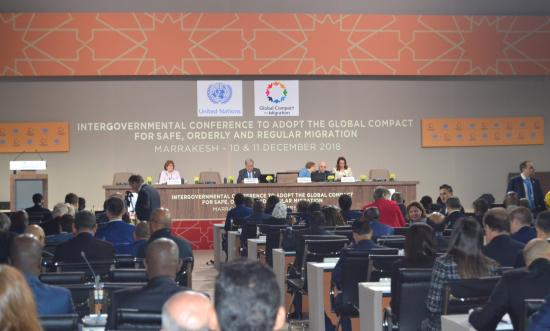
The pact is the first ever internationally recognized guide that will provide a common framework, shared principles and best practices on migration by member states.
Antonia Gutarres, the United Nations Secretary-General during the adoption Conference told delegates that “You are here because you recognize the importance of this Compact as a road map to prevent suffering and chaos, and to provide cooperation strategies that will benefit all.”
“But, there have been many falsehoods about the agreement and the overall issue of migration,” he explained dispelling some myths surrounding the compact.
“The Global Compact is not a treaty and is not legally binding,” the UN Chief observed addressing a myth that the agreement will allow the United Nations to impose migration policies on member states, infringing on their sovereignty.
The adopted compact is a framework for international cooperation negotiated through the willingness of states to guide them on addressing global concerns about migration in conformity with international law.
GCM adoption coincided with the 70th anniversary of the universal declaration of human rights which was signed on December 10, 1948. Gutarres said the GCM wants to ensure human rights which all human beings must have and specifically for migrants if they are moving voluntarily or forced.
The final adoption of the GCM faced a number of withdrawals and negative sentiments from member states like Australia, Austria, Belgium, Czech Republic, Dominican Republic, Hungary, Latvia, Poland, Slovakia and the US.
However, the withdraws did not affect the momentum of the final adoption credited to the government of the kingdom of Morocco that organized and hosted the two-day conference.
Nasser Bourita, Morocco’s Foreign Affairs Minister and President of the Intergovernmental Conference to Adopt the Global Compact for Migration outlined various national efforts undertaken to bring about a global consensus. “We have spared no effort to undertake our responsibility” as a leader on the migration issue and in defending the principles of common responsibility and consensus on migration, and combating smuggling of refugees and migrants, he said, noting that the Government had, among other things, convened four conferences in that regard.
Morocco is aware of the importance of the migration issue and the reality of States’ interdependence, he said. Migration is not confined to any one country or region, but affects all countries.
The Minister said that to adopt a historic Global Compact culminates a process begun in 2016 with the New York Declaration for Refugees and Migrants. It also marks a commitment taken by the international community to overcome a major global challenge.
Madam Louise Arbour, the UN Special Representative for International Migration stressed the importance of the document saying its not just a compact for migration but a compact for safe, orderly and regular migration.
Arbour said that the compact essential strength is in its proactive nature, even though it is not legally binding but has a core of the willingness from member states to cooperate with each other on migration.
The GCM lays out 23 objectives covering all aspects of migration with each having a general goal and catalogue of possible actions that can be implemented by member states.
